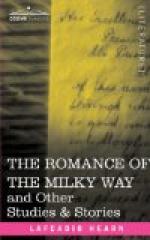“After studying primitive beliefs, and finding that there is no origin for the idea of an after-life, save the conclusion which the savage draws, from the notion suggested by dreams, of a wandering double which comes back on awaking, and which goes away for an indefinite time at death;—and after contemplating the inscrutable relation between brain and consciousness, and finding that we can get no evidence of the existence of the last without the activity of the first,—we seem obliged to relinquish the thought that consciousness continues after physical organization has become inactive.”
In this measured utterance there is no word of hope; but there is at least a carefully stated doubt, which those who will may try to develop into the germ of a hope. The guarded phrase, “we seem obliged to relinquish,” certainly suggests that, although in the present state of human knowledge we have no reason to believe in the perpetuity of consciousness, some larger future knowledge might help us to a less forlorn prospect. From the prospect as it now appears even this mightiest of thinkers recoiled:—
... “But it seems a strange and repugnant conclusion that with the cessation of consciousness at death there ceases to be any knowledge of having existed. With his last breath it becomes to each the same thing as though he had never lived.
“And then the consciousness itself—what is it during the time that it continues? And what becomes of it when it ends? We can only infer that it is a specialized and individualized form of that Infinite and Eternal Energy which transcends both our knowledge and our imagination; and that at death its elements lapse into that Infinite and Eternal Energy whence they were derived.”
* * * * *
—With his last breath it becomes to each the same thing as though he had never lived? To the individual, perhaps—surely not to the humanity made wiser and better by his labors.... But the world must pass away: will it thereafter be the same for the universe as if humanity had never existed? That might depend upon the possibilities of future inter-planetary communication.... But the whole universe of suns and planets must also perish: thereafter will it be the same as if no intelligent life had ever toiled and suffered upon those countless worlds? We have at least the certainty that the energies of life cannot be destroyed, and the strong probability that they will help to form another life and thought in universes yet to be evolved.... Nevertheless, allowing for all imagined possibilities,—granting even the likelihood of some inapprehensible relation between all past and all future conditioned-being,—the tremendous question remains: What signifies the whole of apparitional existence to the Unconditioned? As flickers of sheet-lightning leave no record in the night, so in that Darkness a million billion trillion universes might come and go, and leave no trace of their having been.




